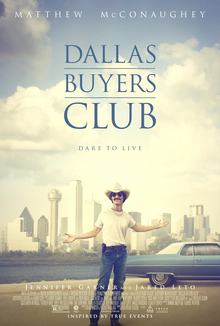
Here’s another of the “small, quality” films up for an Oscar that, like Her, is really not that great. Dallas Buyers Club has many things to admire, but I’m pretty sure its nomination and ecstatic reviews have more to do with its “worthiness” than its actual effectiveness as a motion picture.
The movie is based on the true story of Texas bad boy Ron Woodroof. According to the picture, Woodroof, a gambler, druggie and rodeo rider, contracted AIDS from his wild heterosexual lifestyle back in 1985, when the epidemic was just going public in a big way. Frustrated with government’s incompetence in dealing with the new health crisis, he became a smuggler of experimental drugs. Along the way, as Homer Simpson might say, he learned an important lesson about tolerating the gay people who were dying all around him. (There’s apparently some evidence Woodroof was actually bisexual and that the movie’s homophobe-to-gay-liker story is bogus, but I’m just writing about the movie I saw.)
Matthew McConaughey does his usual fine job with the lead. Jared Leto is nominated for a supporting Academy Award for playing a gay transvestite heroin addict and he deserves to win. I know this sort of role is meat and drink to actors (it’s a lot harder to play a vanilla accountant and make it sing), but Leto just kills it, winning your heart the second he comes on screen with the character’s kindness, intelligence and vulnerability.
What’s strange about the picture, though, is its overall lack of feeling. It’s cold and seems to be operating on autopilot — as if director Jean-Marc Vallée (who did a good job with The Young Victoria) expects the audience to do the work of feeling things he never takes the trouble to make them feel. McConaughey’s transition from gay-hating good ol’ boy to tolerant good ol’ boy is told rather than shown. The payoff delivers no punch whatsoever. The end of Leto’s character arc actually occurs offscreen, leaving you without much sense of resolution for the one really sympathetic guy in the story. I wanted to bring in my unshed tears for a refund! And McConaughey’s character never really achieves the level of AIDS Schindler because, while his fights with the idiots in government resonate, his crusades against AZT and “Big Pharma” seem misguided. Pharma was doing what it had to do, and the drug ultimately turned out to be helpful. It’s silly to make villains out of well-intentioned people swamped by crisis.
This is a film-worthy period. The AIDS epidemic at its height was a genuine historic event. Good people died — a lot of them — and attitudes — toward health, toward homosexuality, toward sex in general — were changed forever. It’s a good setting for a story. But this weirdly flat film just doesn’t bring it to life. It’s not a bad movie. It’s certainly watchable and the good cast delivers some entertaining moments. But strange as it may sound, it could’ve used a little more Hollywood, a little more hearts and flowers all around.









Join the conversation as a VIP Member